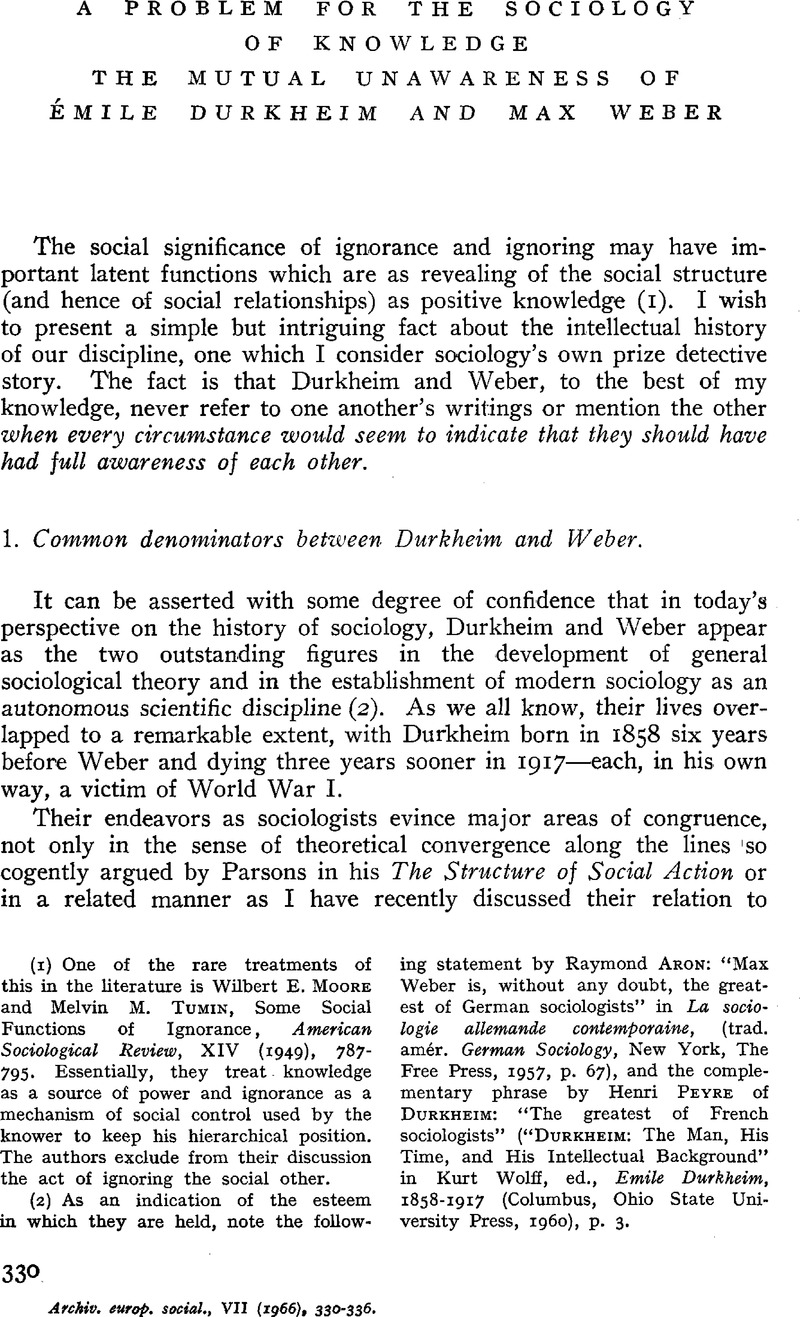Published online by Cambridge University Press: 28 July 2009

(1) One of the rare treatments of this in the literature is Moore, Wilbert E. and Tumin, Melvin M., Some Social Functions of Ignorance, American Sociological Review, XIV (1949), 787–795CrossRefGoogle Scholar. Essentially, they treat knowledge as a source of power and ignorance as a mechanism of social control used by the knower to keep his hierarchical position. The authors exclude from their discussion the act of ignoring the social other.
(2) As an indication of the esteem in which they are held, note the following statement by Aron, Raymond: “Max Weber is, without any doubt, the greatest of German sociologists” in La sociologie allemande contemporaine, (trad, amér. German Sociology, New York, The Free Press, 1957, p. 67)Google Scholar, and the complementary phrase by Henri Peyre of Durkheim: “The greatest of French sociologists” (“Durkheim: The Man, His Time, and His Intellectual Background” in Wolff, Kurt, ed., Emile Durkheim, 1858–1917 (Columbus, Ohio State University Press, 1960), p. 3.Google Scholar
(3) Existential Phenomenology and the Sociological Tradition, American Sociological Review, XXX (1965), pp. 674–688.Google Scholar
(4) On Weber here, see The Methodology of the Social Sciences, tr. and ed. by Shils, E. A. and Finch, H. A. (New York, The Free Press of Glencoe, 1949), p. 69Google Scholar; also Gerth, H.H. and Mills, C. W., From Max Weber: Essays in Sociology (New York, Oxford University Press, 1958), p. 177Google Scholar. Durkheim's rejection of bio-racial interpretations of social phenomena is illustrated in Book I, Chapter II of Le Suicide.
(5) Gerth, H. H. and Mills, W. Wright, eds, op. cit. pp. 37–43.Google Scholar
(6) No less an eminent figure than Karl Jaspers has said of Max Weber that he was “the greatest. German of our age”. Jaspers, Karl, Three Essays (New York, Harcourt, 1964), p. 189.Google Scholar
(7) There is a footnote reference on page III of Purkheim, 's Sociologie et Philosophic (Paris, Presses Universitaires de France, 1951)Google Scholar to a M. Weber. This, however, was Louis Weber, secretary of the Société française de Philosophie and author of Le rythme du progrès, but so far as I know unrelated to Max Weber.
(7) Professor Aron in a personal communication has informed me that when Marcel Mauss visited Max Weber at Heidelberg, he found in Weber's library a complete set of the Année. Mauss, in a conversation with Raymond Aron before World War II, told the latter that Weber “had borrowed many ideas” from Durkheim and his students.
(8) New York, A. Knopf, 1925.
(9) L'année sociologique, n.s., vol. II (1924–1925), pp. 176–19Google Scholar [a]. It has not been possible to find out who was the reviewer, as the copies of the issue end abruptly on page 192.
(10) L'Année sociologique, XII (1909–1912), pp. 678–687.Google Scholar
(11) After all, the form of relationship embodied in the notion of “Gesellschaft” is strikingly similar to Spencer's “contractual relations” which Durkheim had vigorously criticized in De la division du travail social.
(12) Georges Gurvitch, Le concept de structure sociale, Cahiers internationaux de sociologie, XIX, n.s. (1955), 3–44.Google Scholar
(13) Eugène Fleischmann has stated with some reason that “Le nationalisme était pour Weber la ‘valeur’ absolue par rapport à quoi se situe toute politique”, in his “Métamorphoses webériennes”, Archives européennes de sociologie, V (1964), pp. 126–129Google Scholar. However, I would take Weber to be a “cultural nationalist”, in this respect much like Max Scheler. See also Gerth, and Mills, , op. cit. pp. 171–176Google Scholar for Weber's views on the nation. As to Durkheim's position on nationalism and patriotism, see in particular his posthumous Leçons de sociologie (Paris, Presses universitaires de France, 1950), pp. 87–91.Google Scholar
(14) From 1870 to World War I there was considerable concern and even alarm in France as to the spreading influence of German culture in various intellectual spheres. In 1902 the Kaiser called for “world supremacy” of the German mind. In response Jacques Morland of the Mercure de France sent a questionnaire to various eminent figures asking them to assess the Germanic influence in their own area. Durkheim in his published answer stated that although in his early formative years he had learned from German social science the complexity of social reality, he felt that sociological studies were now lagging behind in Germany and that “je ne vois pas se produire d'impulsion nouvelle dans l'ordre des sciences sociales”. The tone of his remarks is a rather negative evaluation. See Mercure de France, XLIV (1902), 647–648.Google Scholar
(15) “[…] Si la pratique de la science, si la pensée scientifique exigent la tolérance, le savant en fait se montre fréquemment intolérant”, Pelseneer, Jean, “La psychologie du savant de genie”, Janus, II (1964), 62–64Google Scholar. Among the numerous personal clashes in the history of science, the author mentions the antagonisms between Descartes and Fermat, Leibniz and Newton, Cantor and Kronecker, Jeans and Eddington. The Durkheim-Web or relationship might well be the classic sociological case, one of these instances characterized by, in the words of Pelseneer, “une opposition sourde”.
(16) Thus, Durkheim was listed as an advising editor of the American Journal of Sociology as early as its second issue (September 1895) and continued to be so listed until the interruption of World War I. While Simmel and Tönnies were also foreign editors of the journal, Weber not only was not given this honorific position but furthermore none of his works was reviewed in the AJS as late as 1935. On the contrary, Durkheim's writings were frequently discussed in his own lifetime.